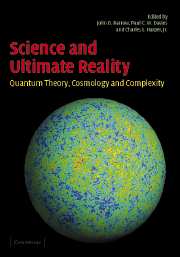Book contents
- Frontmatter
- Contents
- List of contributors
- Foreword
- Editors' preface
- Preface
- Acknowledgments
- Part I An overview of the contributions of John Archibald Wheeler
- Part II An historian's tribute to John Archibald Wheeler and scientific speculation through the ages
- Part III Quantum reality: theory
- 3 Why is nature described by quantum theory?
- 4 Thought-experiments in honor of John Archibald Wheeler
- 5 It from qubit
- 6 The wave function: it or bit?
- 7 Quantum Darwinism and envariance
- 8 Using qubits to learn about “it”
- 9 Quantum gravity as an ordinary gauge theory
- 10 The Everett interpretation of quantum mechanics
- Part IV Quantum reality: experiment
- Part V Big questions in cosmology
- Part VI Emergence, life, and related topics
- Appendix A Science and Ultimate Reality Program Committees
- Appendix B Young Researchers Competition in honor of John Archibald Wheeler for physics graduate students, postdoctoral fellows, and young faculty
- Index
4 - Thought-experiments in honor of John Archibald Wheeler
from Part III - Quantum reality: theory
Published online by Cambridge University Press: 29 March 2011
- Frontmatter
- Contents
- List of contributors
- Foreword
- Editors' preface
- Preface
- Acknowledgments
- Part I An overview of the contributions of John Archibald Wheeler
- Part II An historian's tribute to John Archibald Wheeler and scientific speculation through the ages
- Part III Quantum reality: theory
- 3 Why is nature described by quantum theory?
- 4 Thought-experiments in honor of John Archibald Wheeler
- 5 It from qubit
- 6 The wave function: it or bit?
- 7 Quantum Darwinism and envariance
- 8 Using qubits to learn about “it”
- 9 Quantum gravity as an ordinary gauge theory
- 10 The Everett interpretation of quantum mechanics
- Part IV Quantum reality: experiment
- Part V Big questions in cosmology
- Part VI Emergence, life, and related topics
- Appendix A Science and Ultimate Reality Program Committees
- Appendix B Young Researchers Competition in honor of John Archibald Wheeler for physics graduate students, postdoctoral fellows, and young faculty
- Index
Summary
Beyond the black hole
In 1979 we held a symposium at the Institute for Advanced Study to celebrate the hundredth birthday of Albert Einstein. Unfortunately Einstein could not be there, but John Wheeler made up for Einstein's absence. Wheeler gave a marvelous talk with the title “Beyond the black hole,” sketching with poetic prose and Wheelerian pictures his grand design for the future of science. Wheeler's philosophy of science is much more truly relativistic than Einstein's. Wheeler would make all physical law dependent on the participation of observers. He has us creating physical laws by our existence. This is a radical departure from the objective reality in which Einstein believed so firmly. Einstein thought of nature and nature's laws as transcendent, standing altogether above and beyond us, infinitely higher than human machinery and human will.
One of the questions that has always puzzled me is this. Why was Einstein so little interested in black holes? To physicists of my age and younger, black holes are the most exciting consequence of general relativity. With this judgment the man-in-the-street and the television commentators and journalists agree. How could Einstein have been so indifferent to the promise of his brightest brainchild? I suspect that the reason may have been that Einstein had some inkling of the road along which John Wheeler was traveling, a road profoundly alien to Einstein's philosophical preconceptions.
- Type
- Chapter
- Information
- Science and Ultimate RealityQuantum Theory, Cosmology, and Complexity, pp. 72 - 89Publisher: Cambridge University PressPrint publication year: 2004
- 6
- Cited by

